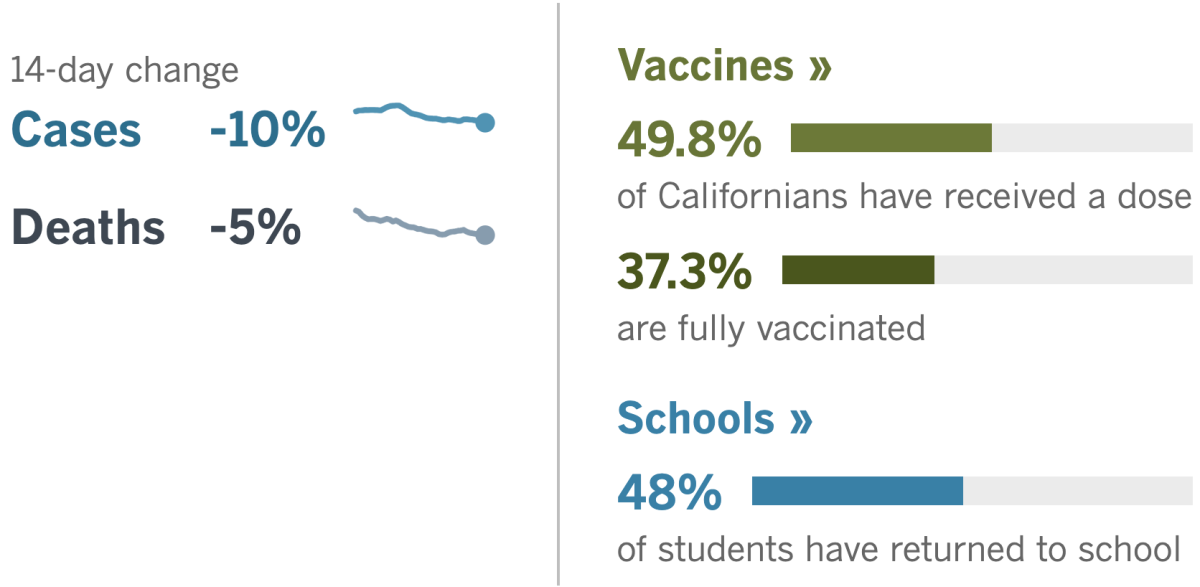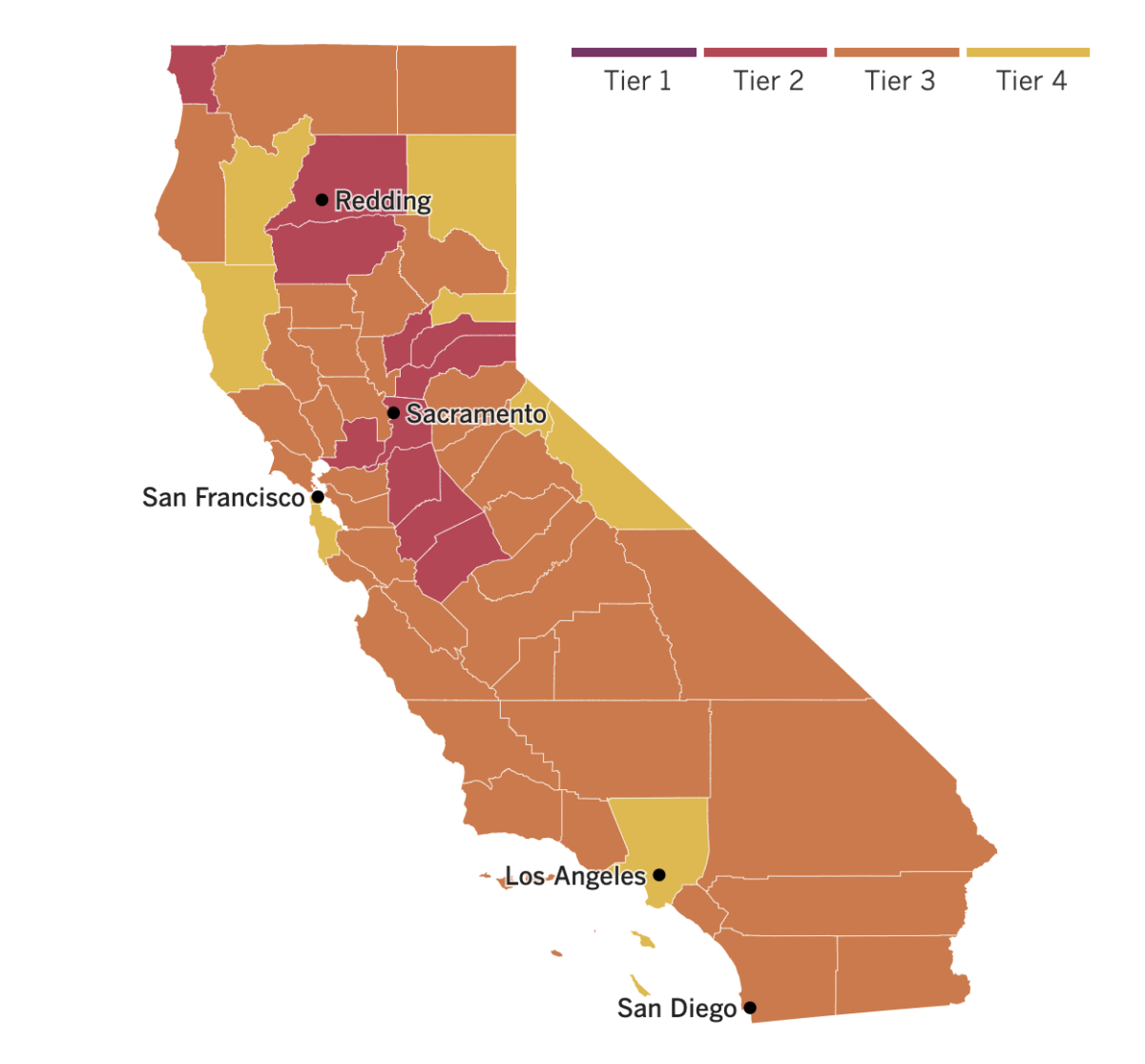Coronavirus Today: Mixed messaging on masks
Good evening. I’m Kiera Feldman, and it’s Thursday, May 13. Here’s what’s happening with the coronavirus in California and beyond.
You’d think, nearly a year and a half into the pandemic, public health officials would have figured out a way to keep mask guidelines clear and simple.
Not so much.
The less-than-ideal messaging proficiency of the federal Centers for Disease Control and Prevention was on display again Thursday, when its mask guidance changed just two weeks after its previous update.
“Anyone who is fully vaccinated can participate in indoor and outdoor activities, large or small, without wearing a mask or physical distancing,” said Dr. Rochelle Walensky, the CDC’s director.
It didn’t take long for the Twitterverse and group texts to light up with essential questions: What about movie theaters? What about people with kids?
And my personal peak-anxiety-inducing question: How will I know if the unmasked face next to me in the grocery store is attached to a vaccinated body?
Well ...
It turned out that CDC announcement was missing some key details.
Masks are still required for everyone traveling on public transportation, including buses and trains, as well as in airports, my colleagues Rong-Gong Lin II and Hayley Smith explain. Masking rules still apply for hospitals, prisons, homeless facilities and other institutional settings.
And the biggest caveat: State and local rules may be stricter than the CDC’s guidance. Rules about masks in businesses, schools and other places where it may be hard to tell who is and isn’t vaccinated will probably be determined at a local level, CDC officials said.
Still confused? Me too.
But here in L.A., nothing is changing just yet. County officials said Thursday that the existing rules will remain in effect.
At all businesses, including restaurants and supermarkets, workers and patrons must stay masked. These are statewide requirements set by the California Division of Occupational Safety and Health. Cal-OSHA next meets on May 20, so the rules won’t change before then.
Muddled messaging aside, one thing is exceptionally clear: Vaccines work — phenomenally well. That’s what makes it possible to even consider taking these steps back toward normal life.
Some experts were eager to embrace the CDC’s announcement. One of them was Dr. Robert Kim-Farley, a medical epidemiologist at UCLA
“I am very excited that we have reached this momentous time when those who are fully vaccinated can now get back to virtually pre-pandemic activities without concern of disease themselves,” he said.
By the numbers
California cases, deaths and vaccinations as of 6:45 p.m. Thursday:

Track California’s coronavirus spread and vaccination efforts — including the latest numbers and how they break down — with our graphics.

Across California
For those of us who have stayed close to home for more than a year, venturing out into the world is starting to sound better than ever. The signs are springing up all around us.
One of them is at Hollywood Burbank Airport. On Thursday, low-cost carrier Frontier Airlines announced plans to start flying out of the airport with routes to Las Vegas, Phoenix and Denver beginning in July.
The number of passengers traveling through U.S.-based airports is still only about 60% of pre-pandemic levels, and the Burbank airport is among the nation’s hardest hit, losing more than 31% of its airline seating capacity over the last year.
But the Frontier announcement suggests things are looking up, especially since it comes less than a month after a former United Airlines executive made Burbank the launch pad for a new low-cost carrier called Avelo Airlines.
Here’s more proof that we’re spending less time at home on the couch: The streaming services that grew like gangbusters during the pandemic are starting to slow down.
Disney+ added fewer subscribers than expected in the most recent quarter, the company said Thursday. Last month, Netflix said it added a disappointing 4 million global subscribers in the most recent quarter. And the field has become more competitive since the start of the pandemic, thanks to the addition of services including HBO Max, Peacock and Paramount+.
It remains to be seen whether this slowdown is a temporary blip or an indicator of a larger trend. Hulu, which is owned by Disney, saw its numbers improve.
If you’re ready to leave your living room but you’re not quite ready to fly, consider a night at the Dorothy Chandler Pavilion. L.A. Opera’s first indoor show will be June 6, with a free performance of “Oedipus Rex.” It’ll be the first in-person performance since the March 8, 2020, staging of “Roberto Devereux.”
To attend the show, patrons must show proof of full COVID-19 vaccination or negative results from a coronavirus test taken within 72 hours of curtain. The vaccinated audience members will get to sit in the orchestra section, while others will be assigned socially distanced seating one level up.
In economic news, Gov. Gavin Newsom on Thursday proposed giving small-business owners an additional $1.5 billion in financial help.
The money would be added to a program launched in January that distributes federal COVID-19 aid to small businesses in the form of grants worth up to $25,000. If Newsom’s proposal is adopted, the program would get a total of total $4 billion, making it the largest initiative of its kind in the country, the governor said.
The extra money would pay for an additional round of grants for some 150,000 small businesses, officials estimated.
The state has received about 350,000 applications for funding. So far, nearly 200,000 grants have been awarded.


See the latest on California’s coronavirus closures and reopenings, and the metrics that inform them, with our tracker.
Consider subscribing to the Los Angeles Times
Your support helps us deliver the news that matters most. Become a subscriber.
Around the nation and the world
The origin story of COVID-19 has long been treated as a foregone conclusion — the coronavirus originated in animals, jumped to an intermediary species and then infected humans. But some scientists now say we should revisit the matter. Did the SARS-CoV-2 virus escape from a lab? A group of 18 scientists from some of the world’s most prestigious research institutions are urging their colleagues to give this idea a serious look, my colleague Deborah Netburn explains.
In a letter published Thursday in the journal Science, the scientists argue that there is not enough evidence to rule out the possibility that COVID-19 accidentally escaped from a lab in China. They’re calling for a “proper investigation.”
“We’re reasonable scientists with expertise in relevant areas,” said Dr. David Relman, a professor of microbiology and immunology at Stanford University who helped pen the letter. “We don’t see the data that says this must be of natural origin.”
Ravindra Gupta, a professor of clinical microbiology at the University of Cambridge, said he would like to review lab notes from scientists working at the Wuhan Institute of Virology, a research center where coronaviruses are studied. He’d also like to see a list of viruses that have been used at the institute over a five-year period.
With more than 3.3 million lives already lost, why does it matter now? If the coronavirus did get loose from a lab, Relman explained, “then we’re talking about thinking much more seriously about what kinds of experiments we do and why.”
The coronavirus’ spread has people around the world holding digital thermometers up to foreheads and wrists to look for people who might be infected. But a new study questions the value of those temperature checks in children. It found that most kids infected with the virus had normal temperatures and were generally free of other typical COVID-19 symptoms.
The study looked at more than 12,000 children with laboratory-confirmed infections and found that only 19% of them developed a fever.
What’s more, nearly three-quarters of the infected children lacked “any of the typical COVID-19 symptoms” — a fever, cough or shortness of breath — researchers wrote Thursday in the journal Scientific Reports.
So how are schools and other institutions supposed to flag kids with infections who might spread the virus to others? The researchers suggested more random testing, as well as focusing tests on children from higher-risk households and those with medical conditions that put them at greater risk of serious disease if they become infected.
Another group of researchers has a different kind of idea for keeping us safe from threats like the coronavirus. They’re calling for sweeping changes in building design to reduce the risk of spreading airborne diseases like COVID-19, my colleague Richard Read reports.
We have long known that the coronavirus spreads easiest indoors. Opening windows and increasing airflow are basic precautions these days. But those steps don’t go far enough, the researchers argue in the journal Science.
The 39 experts from an array of fields called for a “paradigm shift” in the design of buildings and their ventilation systems. Only hospitals have air supply systems that are up to par. But if they became widespread, the result would be a societal change on par with the 19th century introduction of clean water supplies and centralized sewage systems.
“Think of how many cases during this pandemic could have been prevented if this was taken seriously,” said Lidia Morawska, a physicist at the Queensland University of Technology in Australia.
Your questions answered
Today’s question comes from readers who want to know: What do I need to do to get a COVID-19 shot for my younger teen?
We already talked about when kids as young as 12 can start to get vaccinated (today!). Now here’s how to get those jabs in L.A. County and throughout California.
Vaccination appointments can be made in English at VaccinateLACounty.com or in Spanish at VacunateLosAngeles.com. If you don’t have internet access, you can call (833) 540-0473.
Another option is to head over to California’s My Turn vaccine scheduling website.
Or you can skip all of that and just show up at a county-run vaccination site without appointment — they’ll take walk-ins.
In Orange County, you can walk in for a shot or schedule an appointment. More information on your options is available here.
Anyone younger than 18 should be accompanied by a parent, guardian or responsible adult. They’ll need to bring photo identification and proof that they are at least 12 years old. Examples of acceptable proof of age in L.A. County are listed here, and for Orange County here.
County-run sites that are offering the Pfizer-BioNTech vaccine — the only one that’s been authorized for use in minors — include Balboa Sports Complex in Encino, the Fairplex in Pomona, the Forum in Inglewood, Cal State Northridge, the L.A. County Office of Education in Downey and Eugene A. Obregon Park in East L.A.
A list of vaccine clinics around the county that offer the Pfizer vaccine can be found at bit.ly/PfizerSites.
We want to hear from you. Email us your coronavirus questions, and we’ll do our best to answer them. Wondering if your question’s already been answered? Check out our archive here.
Resources
Need a vaccine? Sign up for email updates, and make an appointment where you live: City of Los Angeles | Los Angeles County | Kern County | Orange County | Riverside County | San Bernardino County | San Diego County | San Luis Obispo County | Santa Barbara County | Ventura County
Need more vaccine help? Talk to your healthcare provider. Call the state’s COVID-19 hotline at (833) 422-4255. And consult our county-by-county guides to getting vaccinated.
Practice social distancing using these tips, and wear a mask or two.
Watch for symptoms such as fever, cough, shortness of breath, chills, shaking with chills, muscle pain, headache, sore throat and loss of taste or smell. Here’s what to look for and when.
Need to get tested? Here’s where you can in L.A. County and around California.
Americans are hurting in many ways. We have advice for helping kids cope, resources for people experiencing domestic abuse and a newsletter to help you make ends meet.
We’ve answered hundreds of readers’ questions. Explore them in our archive here.
For our most up-to-date coverage, visit our homepage and our Health section, get our breaking news alerts, and follow us on Twitter and Instagram.




